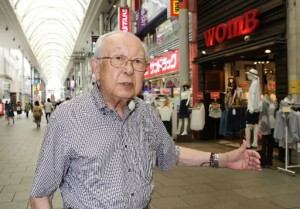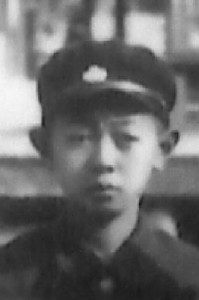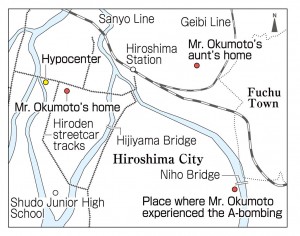Hiroshi Okumoto, 85, Naka Ward, Hiroshima
Sep. 11, 2015
Became determined to open new business on site of parents’ old shop
by Yuji Yamamoto, Staff Writer
It wasn’t just me,” said Hiroshi Okumoto, 85, “Everyone else faced really tough times, too. I couldn’t afford to spend time mourning and shedding tears.” At the age of 15, Mr. Okumoto lost six members of his family, including his parents, because of the atomic bombing. He was determined, though, to stay put on the land left behind by his parents and so, after the war, he worked hard to open a new business in the Hondori shopping district in Naka Ward.
At the time of the bombing, Mr. Okumoto was a third-year student at Shudo Junior High School and he experienced the A-bomb attack while working as a mobilized student at a lumber yard, located about 4.1 kilometers from the hypocenter in Niho-machi (part of today’s Minami Ward). He saw a blinding light, followed by a tremendous boom and blast.
He instinctively hit the ground, shutting his eyes and putting his hands over his ears. At first, he thought the ammunition storehouse at the Army Ordnance Supply Depot (now Hiroshima University’s Kasumi Campus), to the northwest, had perhaps exploded. But then he saw a mushroom cloud rise up over Hijiyama Hill, which lay beyond the supply depot, and expand, spreading to hover over his area. “I felt my life was in danger,” he said.
Mr. Okumoto’s family lived in Harimaya-cho (now part of Naka Ward) and ran a hardware shop there. With a friend, he began to make his way toward the city center. As they walked, they saw people with their burnt skin dangling down from their arms, like gloves peeled off. Because of raging flames, they were unable to venture past Hijiyama Bridge. Instead, they went to Mr. Okumoto’s aunt’s home in Onaga-machi (now part of Higashi Ward). There they remained that night, in an air-raid shelter dug into the garden.
On the following day, August 7, Mr. Okumoto parted from his friend and headed toward his own home. His house, though, had burned to the ground. When he stepped on the spot, he saw flames still alive beneath the debris.
Afterward, at a relative’s home, he found his grandmother, Kayo, who had been evacuated to Mitaki-cho (in today’s Nishi Ward) before the bombing to avoid possible air raids. From there he went out to search for other family members, but as he learned more about their whereabouts at the time of the attack, he had no choice but to believe that they had perished.
Still, he was able to reunite with his mother, Hisako, 38, who experienced the atomic bombing at their storehouse in Kabe-cho (now part of Asakita Ward), which was designated an evacuation point for people living in Harimaya-cho. Although she wasn’t injured, she had no appetite and suffered from black diarrhea. She passed away on the morning of August 14. Mr. Okumoto’s last memory of his mother is of gently massaging her legs.
Mr. Okumoto learned that his 43-year-old father, Yaezo, who was minding their shop at the time of the atomic bombing, was brought to Kuba National School (today’s Kuba Elementary School in the city of Otake). On August 15, Mr. Okumoto went to the town office in Kuba-cho and found his father’s name on a list there, but the notation indicated that he had died on August 12. Mr. Okumoto received a white wooden box containing his father’s remains, then headed for home.
He was unable to find any trace of three siblings: Fumiko, 13, who was helping with the work of tearing down buildings to create a fire lane around Dobashi-cho (in today’s Naka Ward), and Katsuhiko, 8, and Naomichi, 6, who were attending Fukuromachi National School. He believes a small piece of bone, found in the dirt at his father’s shop, belonged to his sister Taeko, who was 4.
After the war, Mr. Okumoto decided to live with his grandmother. Because he was busy with procedures involving their insurance company and local government offices, he had no time for school and dropped out. At the end of the year, he and his grandmother went to live at his aunt’s home in the city of Takamatsu.
In 1949, they returned to Hiroshima, but when his grandmother died in the spring of 1951, Mr. Okumoto was then on his own. That autumn he married his wife Yoko, who was the same age. After selling off some land, he used the money to learn about running a business at a warehouse dealer and opened his own shop in 1962 at the site where his father’s shop had originally stood. Describing how he realized this dream, he said, “I was able to work really hard because my goal was to restore my father’s shop at the same important place where I was born and raised.” However, given the change of times, instead of taking up the family’s original hardware business, which had been sustained for two generations, he opened a men’s clothing store.
Though business was good in the beginning, sales gradually declined due to changing lifestyles. Prompted by his wife’s death from illness at the age of 71 in 2001, he closed the shop.
Because Mr. Okumoto feels such a strong attachment to the address of his old shop, which is “12 Harimaya-cho, Hiroshima City,” this address is still printed on the back of his business card. He is adamantly opposed to war, which turned his hometown into burnt rubble with a single bomb. “If people aren’t able to say ‘No,’ and the nation’s aims are prioritized over people’s lives, history could be repeated. In order to help prevent young people today from experiencing such terrible times, I want to pass on my memories to them,” he said.
Teenagers’ Impressions
Determined to follow his example
Mr. Okumoto was still a teenager, the same as my generation, when he experienced the atomic bombing and had to endure on his own. I was surprised by his strength. I think his deep pride as a citizen of Hiroshima toughened his will to go on. I’m determined to follow his example and have the courage to overcome my difficulties. As a third-generation A-bomb survivor, I will convey his experience to others so that history will not be repeated. (Ai Mizoue, second-year student in junior high school)
Sadness beyond my imagination
When I was in the fourth grade in elementary school, my grandfather died. At the time, I couldn’t face my grief and I didn’t cry. Still, I felt that sadness after a while. Mr. Okumoto said, “Though I lost six members of my family all at once, I didn’t have time to cry.” What he went through is beyond my imagination. His words made me realize that the war brought losses that were so big, people’s minds couldn’t even face the reality of these experiences. (Nanase Shode, first-year student in high school)
Must have the strength to speak out
Mr. Okumoto has continued to live in the same location as he did before the atomic bombing, despite the fact that he lost family members there. This shows the love he feels for his old neighborhood, Hondori. He told us that recent political developments in Japan make him feel that the nation is moving toward war again. This trend worries him, and he said, “If this continues, we may have a future where we’re unable to oppose waging war.” Young people like us should use our strength to make the appeal, “War must never be condoned because it brings such cruel destruction to our towns and our lives.” (Kantaro Matsuo, second-year student in high school)
(Originally published on August 24, 2015)










